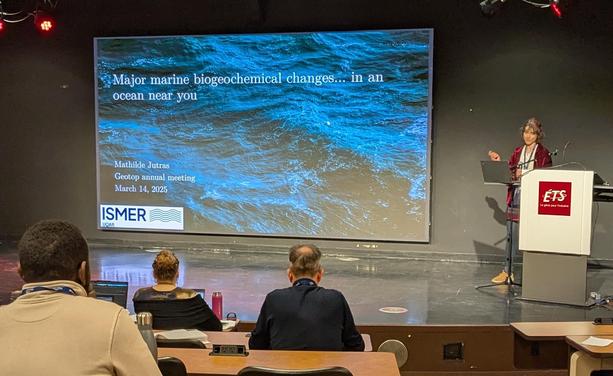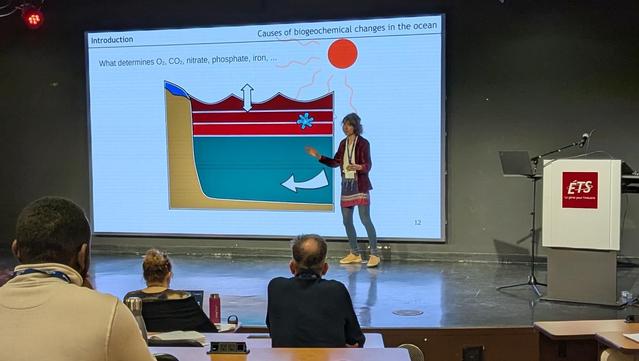Nathalie Lefèvre, Doris Veleda and Susan E. Hartman look at decadal trends in surface fCO₂ and pH in the coastal upwelling off the northwest African coast.
The worrying thing is that contrary to what you might expect, putting more CO2 into the air and then the water does not drive the equilibrium towards more precipitation. Quite the reverse. #oceanacidification
A fascinating keynote talk by Mathilde Jutras (now at the University of Quebec at Rimouski) on ocean chemistry changes due to increased greenhouse gasses. The talk was at the annual meeting of Geotop, the Research Centre in Earth System Dynamics with members from a number of Quebec's research institutions.
You need to be energetic to highlight patterns on the big screen!
John Scales Avery (1933-2024) was an American theoretical chemist. In his book "Civilization's Crisis" he argues that civilization as a whole faces a set of linked challenges. #ClimateChange is caused by consumption of non-renewable #FossilFuels but it is just one aspect of a bigger crisis. Other aspects are #Deforestation, #OceanAcidification, #NuclearWaste and #pollution in general. #ResourceDepletion and #VanishingResources in combination with #OverPopulation will eventually lead to a #collapse of #civilization in this century according to #systemdynamics and classic #limitstogrowth models. The turning point is #PeakOil or the #HubbertPeak which we are reaching now.
https://www.worldscientific.com/worldscibooks/10.1142/10501
More articles from John can be found here
https://www.johnavery.info/
https://phys.org/news/2025-01-groundwater-arctic-carbon-ocean-previously.html
As the #tundrathaw continues and the flow of submarine groundwater ratchets up…the outflow of carbon from shore to sea could effectively make ocean surface waters a carbon source to the atmosphere. The CO2 released via groundwater could also contribute to #oceanacidification.
Groundwater in the Arctic is delivering more carbon into the ocean than was previously known
A relatively small amount of groundwater trickling through Alaska's tundra is releasing huge quantities of carbon into the ocean, where it can contribute to climate change, according to new research out of The University of Texas at Austin.
The problems are not #plastics, #chemicals, #AirPollution, #oceanacidification, #GHGs, #Deforestation, ... other concerns.
The problem is
#CORPORATIONS, #CAPITALISM
"What are the effects of ocean acidification on fishes?" 🐟🌊
#OceanAcidification #MarineLife #ClimateChange #Conservation #EnvironmentalNews
https://blog.rapusia.org/animals/2675/the-effects-of-ocean-acidification-on-fishes/
"How do shark teeth resist ocean acidification?" 🦈🌊
#MarineLife #Sharks #OceanAcidification #Conservation #SharkTeeth
https://blog.rapusia.org/animals/2674/how-shark-teeth-can-resist-ocean-acidification/
https://microbiomejournal.biomedcentral.com/articles/10.1186/s40168-023-01683-y
Decline of a distinct coral reef holobiont community under ocean acidification - Microbiome
Background Microbes play vital roles across coral reefs both in the environment and inside and upon macrobes (holobionts), where they support critical functions such as nutrition and immune system modulation. These roles highlight the potential ecosystem-level importance of microbes, yet most knowledge of microbial functions on reefs is derived from a small set of holobionts such as corals and sponges. Declining seawater pH — an important global coral reef stressor — can cause ecosystem-level change on coral reefs, providing an opportunity to study the role of microbes at this scale. We use an in situ experimental approach to test the hypothesis that under such ocean acidification (OA), known shifts among macrobe trophic and functional groups may drive a general ecosystem-level response extending across macrobes and microbes, leading to reduced distinctness between the benthic holobiont community microbiome and the environmental microbiome. Results We test this hypothesis using genetic and chemical data from benthic coral reef community holobionts sampled across a pH gradient from CO2 seeps in Papua New Guinea. We find support for our hypothesis; under OA, the microbiome and metabolome of the benthic holobiont community become less compositionally distinct from the sediment microbiome and metabolome, suggesting that benthic macrobe communities are colonised by environmental microbes to a higher degree under OA conditions. We also find a simplification and homogenisation of the benthic photosynthetic community, and an increased abundance of fleshy macroalgae, consistent with previously observed reef microbialisation. Conclusions We demonstrate a novel structural shift in coral reefs involving macrobes and microbes: that the microbiome of the benthic holobiont community becomes less distinct from the sediment microbiome under OA. Our findings suggest that microbialisation and the disruption of macrobe trophic networks are interwoven general responses to environmental stress, pointing towards a universal, undesirable, and measurable form of ecosystem change. Video Abstract
#climate #ocean #oceanacidification
"As reported by France 24, the study outlines an alarming future: in just a few years, our oceans may no longer be capable of properly sustaining life or helping to regulate the Earth's climate, thanks to intense acidification."
Scientists issue ominous warning about state of world's oceans: 'Appears inevitable within the coming years'
https://www.thecooldown.com/outdoors/ocean-acidification-impacts-marine-life-climate-future/


